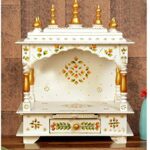Vastu Shastra
Vastu Shastra, often referred to as Vastu, is an ancient Indian architectural and design philosophy that has been followed for centuries. It is based on the belief that the design and layout of a building can significantly impact the energy and well-being of its occupants. In this blog, we will delve into what Vastu is and how it can potentially affect our lives by creating harmonious living and working spaces.
Understanding Vastu
Vastu Shastra is deeply rooted in Indian tradition and philosophy, and it is closely related to the science of architecture and construction. The term “Vastu” itself means “dwelling” or “building” in Sanskrit. Vastu principles encompass a variety of factors related to the design and orientation of buildings, including spatial geometry, placement of rooms, and the use of materials.
Key principles of Vastu include:
Directions: Vastu emphasizes the significance of cardinal directions (North, South, East, and West) and their impact on the energy flow within a space. Each direction is associated with specific elements, deities, and attributes.
Five Elements: Vastu considers the influence of the five elements—earth, water, fire, air, and space—on the energy of a space. Balancing these elements in the design is essential for a harmonious environment.
Energy Flow: The flow of positive energy, or “prana,” is a central concept in Vastu. It is believed that a well-designed space can enhance the flow of positive energy and promote well-being.
Room Placement: Vastu provides guidelines on the ideal placement of rooms, such as the bedroom, kitchen, and study, to optimize the positive effects on occupants’ lives.
How Vastu Affects Our Lives
Vastu is believed to affect our lives in various ways:
Health and Well-Being: A Vastu-compliant home or workplace is thought to promote good health and well-being. Properly oriented spaces with balanced elements can contribute to physical and mental wellness.
Relationships: The layout and design of a space can influence family dynamics and relationships. Vastu principles aim to create a positive and harmonious atmosphere within the home and better interactions among family members.
Career and Finances: A Vastu-compliant workspace is said to enhance productivity and financial success. Properly positioned work areas and offices can help individuals achieve their professional goals.
Emotional Balance: Vastu seeks to create an environment that promotes emotional balance and reduces stress. A well-arranged living space can contribute to a more peaceful and relaxed atmosphere.
Spiritual Growth: For those who are spiritually inclined, Vastu can enhance the spiritual aspect of life. Properly oriented spaces are believed to facilitate meditation, prayer, and a connection to higher consciousness.
Critiques and Scepticism
While Vastu has a significant following, it is not without its sceptics. Critics argue that the principles of Vastu lack scientific validation and that its effects are often subjective. There is no universally accepted standard for Vastu, and interpretations can vary widely.
Furthermore, some argue that the benefits people experience from Vastu-compliant spaces may be due to the psychological impact of living in a well-organized and aesthetically pleasing environment, rather than any mystical or energetic forces.
Conclusion
Vastu Shastra is a tradition deeply ingrained in Indian culture and architecture, offering a unique perspective on how the design and layout of spaces can impact our lives. While its principles are followed by many, they are not universally accepted or validated by modern science.
For those who embrace Vastu, the primary objective is to create an environment that promotes well-being, harmony, and balance. Whether you choose to adhere to Vastu principles or not, the essential aspect is that your living and working spaces should contribute to your overall happiness and satisfaction.
In the end, the way a space affects your life may be influenced as much by your own perception and beliefs as by any traditional or mystical principles. As you consider the principles of Vastu, it is essential to find a balance between tradition and practicality that resonates with your own sense of well-being and harmony.


Industrial Vastu: Enhancing Productivity and Prosperity in Your Factory

Vastu Directions: Unlocking the Secrets to Prosperity in Vastu Shastra




